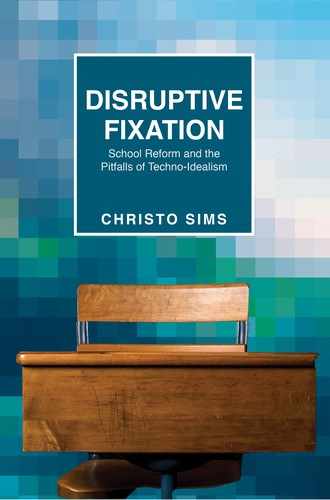First and foremost I would like to thank my research participants, for without their generosity, trust, and openness, this project would not have happened. The designers, backers, and educators of the reform project that this book takes as its focus provided me with nearly unfettered access as they attempted to launch an ambitious and highly visible new intervention. Attempting to redesign social systems is a messy process, and doing so in the public eye takes extra courage. Those whose jobs involved trying to bring this new project into being were far more generous and open with me than they needed to be. While I have taken a critical perspective on the modes of intervention of which they (and I) were a part, I hope the project’s designers, backers, and educators know that I respect what they were trying to accomplish and that I have no doubts about the sincerity of their philanthropic intentions nor about their dedication to trying to help others. If anything, I hope the book helps convince more people that it is both unrealistic and unfair to place the responsibility for actualizing broader social ideals on the shoulders of so few.
I am also grateful for the generosity of the parents and guardians that participated in the study. Many invited me into their homes and a few became real friends. I have yet to have children of my own, but if and when I do, I will keep these families fondly in mind as I try to navigate the inevitable—and often impossible—dilemmas inherent in processes of child rearing. I also want to offer an especially heartfelt thanks to the students. Being a middle school student is often a confusing, awkward, and painful experience, even for the so-called popular kids. In going to middle school, students learn to judge and be judged, they learn that just about everything they say or do means more than they thought, and they experience seemingly solid friendships that suddenly evaporate, bodies that no longer look or feel the way they used to, and that everyone is changing and it’s not at all clear if and how they should change as well. At the same time, middle school can be exhilarating. There are new people, new places, new outfits, new music, new routines, and new things to try out. I feel lucky and grateful that so many young people allowed me into this awkward and bewildering moment in their lives, that they were willing to share their excitements and agonies, and their moments of pride and joy as well as their moments of embarrassment and sorrow. At the end of the day, getting to know these young people was the best part of doing this project.
Beyond the field, I have been supported by such a wide and generous collection of people that I cannot do justice to all of their contributions. Paul Duguid deserves special thanks since he has done more than anyone to help me develop as a scholar. If it were not for Paul, I would not be where I am today, and there is a good chance I would not have made it through graduate school. Paul is one of those rare scholars who puts far more effort into advising than the profession demands or rewards. As I have spent more time in academia, it has become increasingly clear that Paul’s approach to advising is as uncommon as it is exceptional. At Berkeley I was also fortunate to receive generous feedback and support from Jean Lave, Barrie Thorne, Peter Lyman, Anno Saxenian, Jenna Burrell, Dan Perkel, Megan Finn, and Janaki Srinivasan, all of whom I thank fully and sincerely. During this time I also had the good fortune to work on several collaborative research projects, and through these experiences I was lucky to receive generous support and mentorship from more senior scholars, most notably Heather Horst, C. J. Pascoe, Becky Herr-Stephenson, danah boyd, Ingrid Erickson, Diana Rhoten, Richard Arum, and Mimi Ito. During my time in New York City, Christina Dunbar-Hester and Jeffrey Lane provided invaluable intellectual guidance and moral support. At UC San Diego, where I now work, I would like to offer special thanks to Robert Horwitz for reading and providing helpful feedback on a full draft of this manuscript, as well as Fernando Domínguez Rubio for reading sizable portions of the manuscript during an especially challenging period of writing. I am also grateful to Lilly Irani, Chandra Mukerji, Vanesa Ribas, Natalia Roudakova, Kelly Gates, and Angela Booker for reading portions of the manuscript, as well as Mike Cole, Stefan Tanaka, Jay Lemke, and the rest of my colleagues in the Department of Communication for their ongoing encouragement and support. Similarly, I would like to thank the two anonymous reviewers, Tom Boellstorff, Fred Appel, and the rest of the Princeton University Press team for their support and for helping me improve the manuscript and learn the academic book-publishing process more generally.
To my family, I offer thanks for years of encouragement, dedication, and love. The older I get, the more I realize how fortunate I am for having grown up with the family I did. It is a debt that I can only hope to repay by drawing on their example in my relations with others. Finally, to Paloma I offer heartfelt gratitude for her ongoing intellectual and emotional support. Writing a book entails its own fixations, and those who are closest to the author share the tolls that these fixations extract in particularly intimate ways. I am especially indebted to Paloma for helping me sustain an enchantment for writing, and for life more generally, throughout this process.
